Another Timbre TimHarrisonbre
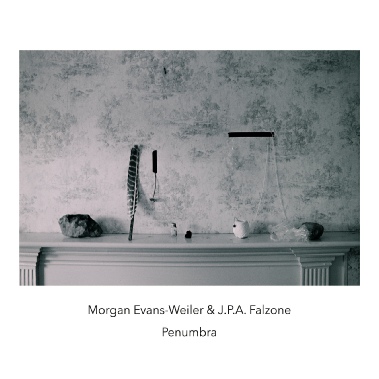
Interview with Morgan Evans-Weiler
Can you tell us how Penumbra came into being? To what extent was it pre-planned or pre-composed, and to what extent are you and James improvising?
Some of the material for the piece originated around 2020 when I was in graduate school, mostly the melodic cells. A few years passed when I chose to be less active, but I kept thinking about these little sonic objects. Then, when I was ready to come back to some music projects, James and I wanted to work together again and I returned to this material and expanded the language a bit. The pages for the piece are simple sets of melodic and harmonic material. I came in with concepts for the electronic tones for each movement and some ideas for approaching the performance. Other than that, what you hear is an exploration of a simple set of material and our navigations through it together. I generally think of the pages of the "score" as maps that can be read and traversed as the players see fit. I like to think of it as improvising, but enough is determined that it is perhaps not quite that - plenty of indeterminacy, though.
I hadn’t realised that you’d taken a bit of a break from music. I’m interested in that, and guess it’s often a good idea. But why did you do it, and what made you come back?
There were a great many reasons for taking a step back from music, but in retrospect, it really wasn’t that long of a break, though it certainly felt like it because I had been working so relentlessly and been so active for so many years prior. It was just the right confluence of events. COVID hit and that put an end to some projects that I was planning. I was also in graduate school at that time for visual art and when I came out of that my aesthetic energy was completely depleted and very disrupted. Along with all of that was a sort of realization that I had an unhealthy relationship with how/where I wanted my art/music to be, the opportunities I was seeking, etc… – or even the thought that I believed an art/music career was possible. Naturally, I became rather depressed about my creative life so had to step back and completely reevaluate. I moved to a new city (Philadelphia, where I am now based) and I had a child, which helped slow me down and rethink my time.
But really, the break ended up being a good thing for me as it gave me time to reflect and adjust. I did gain quite a bit of clarity about how I wanted music to exist in my life and which sorts of artistic experiences I wanted to prioritize. Also, the space away helped me finally admit to myself that I really wasn’t enjoying performing at all and now not doing it feels great. So as of right now I’m prioritizing collaborating with friends and making recordings.
Yes, as I said, I’m sure that allowing oneself breaks is an important and often neglected part of the creative process. But getting back to ‘Penumbra’, to my ears it’s wonderfully structureless music; sounds drifting without any clear direction, sometimes coinciding but without developing, so that each piece could end at almost any moment. Firstly, is this accurate? Secondly, it strikes me that it must be increasingly hard to make this sort of music really work, partly because similar things have been done for the past 30 years at least, so it's hard to keep it fresh and interesting (which you do somehow). Do you see what I mean, and if so, any thoughts?
Yes, I'd say that is an accurate hearing of the environment we hope to create. I don't have much interest in putting things in any particular order, rather, I'd like to just hear the possibilities of a set of objects. I started working with assemblage sculpture years ago and now I think of this way of playing in the same way. Finding the resonances between materials, and discovering how materials best express themselves and enliven counterpoints, etc... So, here our sounds can just constellate and go nowhere in particular, where we can just hear and try different repetitions, permutations, and combinations and not concern ourselves with an order of things - success is maybe gauged differently here, I don't know. I like your "end at any moment" comment - I like to think of beginnings and endings as arbitrary, what is captured is a snapshot of a process.
I'm not sure if I can speak to it being increasingly hard to make this sort of music work, but I can say that it makes a huge difference having a musical partner like James. He remains a steadfast explorer in these situations with me and I consider myself privileged to have someone that I can trust so deeply in these musical environs. I'm not sure I ever really feel as though I'm doing anything particularly new, I just remain committed to this approach and to the various discoveries that it offers, and it usually feels new and interesting for me.
Have you ever composed a piece that is ‘through-composed’ in the sense of being as prescriptive as possible of all the sounds, leaving the performers little scope for interpretation?
I have tried, over the past 20 years or so, to write through-composed pieces, but it hasn’t felt right enough to stick, and it doesn’t seem to gel with my creative process at this point anyhow. I’ve been pretty unhappy with the results of those through-composed attempts I’ve made, so I don’t really bother anymore.
Certainly during my undergraduate studies, I was composing in a traditional way; notated pieces, all sounds prescribed, much less open interpretation. But as I got more involved in improvisation, electronic music, and noise music, it seemed easy to leave those approaches behind. I appreciate and value the sort of organic music making process that comes along with those approaches and it seeped into my method. Then, it became much more about finding the sound worlds I wanted to explore and looking for ways to signify those sound worlds for people to explore with me – putting things in sequence and illustrating all the details hasn’t fit into this process for me. The sort of possibility of ‘what could happen’ has become much more exciting to me than the ‘what will happen because I have dictated it’. And further, my sort of visual score language developed alongside a visual art practice that seemed to just make sense for these sorts of open possibilities of a sound world.
That sounds like it’s a really sensible approach for you personally. I’m interested in how having a child has affected your creativity. I think that I’d have found it impossible to do anything even remotely creative during the 20-odd years when I had children growing up in the family. Obviously some people manage it, but I just wouldn’t have had the headspace aside from the delightful chaos of family life. So I’m impressed that you have restarted music as a parent. Do you find it hard, or rewarding?
It certainly has been difficult to find time for my creative life with this huge life change; I can totally understand why some people have a complete halt to their creative lives upon having kids. Our domestic life is so busy and chaotic, my partner and I both work regular 9-5 type jobs and we don’t have a lot of family around to help us with childcare. But I remain committed to continuing my work despite the challenges it poses. Also, upon moving to Philadelphia, I no longer have a dedicated creative space which I had maintained for more than a decade prior. I really miss having a studio, but I’m also happy to try to figure out how to make things work this way. In my experience, limitations often end up leading to interesting creative results. So for now, I’m trying to lean into this as a way of working (even though I also find it frustrating). It has been easier, as a parent, for me to continue musical pursuits, but unfortunately, visual art has stalled a bit for me. Eventually, I’ll figure out that piece of the puzzle.
Part of my recent realisation (detailed above) was that I don’t need to work so much to have a creative life, and fortunately, that gels well with the realities of being a parent. So, I’m becoming comfortable with periods of activity and inactivity, exploring longer timeframes for creative pursuits, and being very choosy about what I spend time on. Also, my approach now is much more project based, rather than my old daily workflow. I plan for a few projects per year, and leading up to the recording of those projects, I work just about everyday preparing. When I’m not preparing for a recording project, I’m either completely inactive or I’m finding time on evenings, lunch breaks, and weekends to experiment, work on sound collages, research, etc… And these projects now definitely require travel; being away from my family can be complicated and difficult, but I also find it so healthy to recharge my creative battery during these short times away.
It is interesting, having a kid has softened certain things about my aesthetic language, while hardening some others. I think the urgency of having a child in America during some very stark social, political, and environmental realities is pushing me to have an even harder, uncompromising edge in my ideas, politics, and aesthetics, while also the presence of a little person makes me somehow more open-minded and receptive to simple and harmonious affects and developments in my work. It continues to be a weird mental space to inhabit.
at231 Morgan Evans-Weiler & J.P.A. Falzone
‘Penumbra’
Four wonderful minimal duos from 2024
Penumbra I 8:11
Penumbra II 11:12
Penumbra III 13:32
Penumbra IV 10:28
Morgan Evans-Weiler, violin & electronics
J.P.A. Falzone, prepared piano & celesta
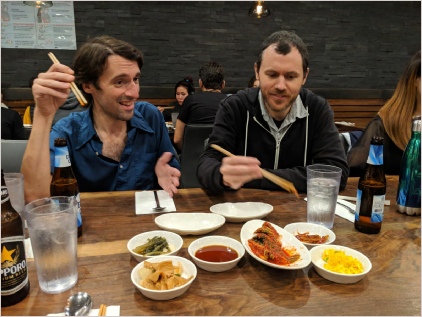
James Falzone & Morgan Evans-Weiler
Previous releases by Morgan Evans-Weiler
Click on covers for more details
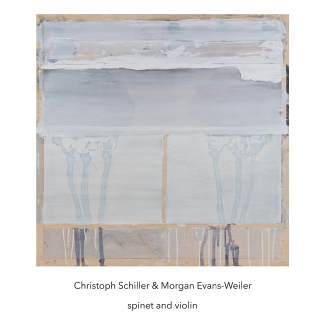
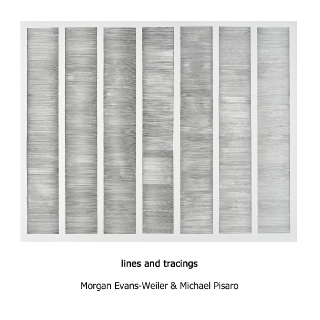
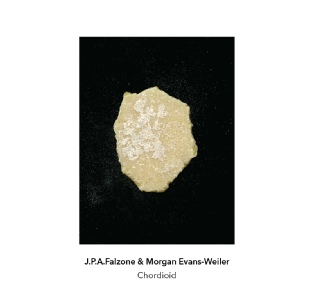
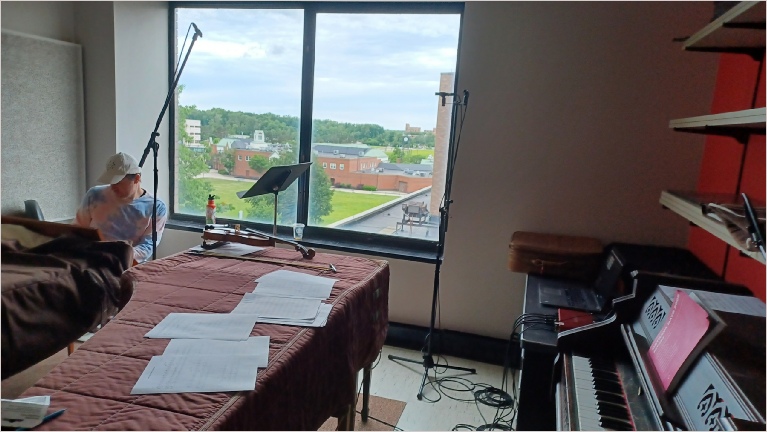
at112 Christoph Schiller & Morgan Evans-Weiler
‘spinet and violin’
at134 Morgan Evans-Weiler & Michael Pisaro
‘lines and tracings’
at152x2 J.P.A. Falzone & Morgan Evans-Weiler
‘Chordioid’